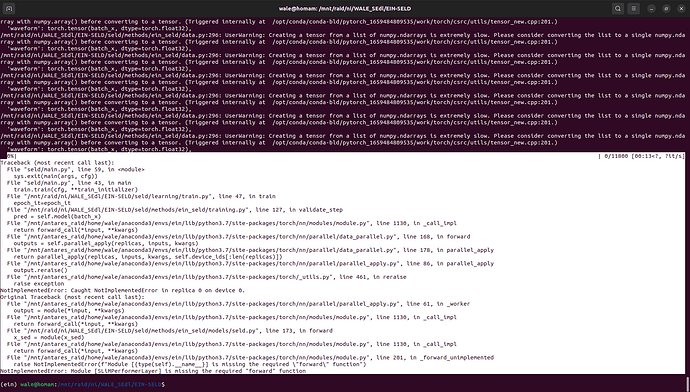Please I have a similar issue with my script here:
from IPython.core.completerlib import module_list
from numpy.core.fromnumeric import shape
import torch
import torch.nn as nn
import torch.nn.functional as F
from torch.nn.modules.container import ModuleList, Sequential
from methods.utils.model_utilities_orth import ( CustomCNN,PositionalEncoding, init_layer) #( DoubleConv,PositionalEncoding, init_layer)
from methods.utils.cbam import CBAM
from performer_stuffs.slim_performer_model import SLiMPerformerLayer
#import performer.models.slim_performer.pytorch.numerator_and_denominator as num_and_den
from performer_stuffs import numerator_and_denominator as num_and_den
class EINV2(nn.Module):
def init(self, cfg, dataset):
super().init()
self.pe_enable = False # Ture | False
if cfg['data']['audio_feature'] == 'logmel&intensity':
self.f_bins = cfg['data']['n_mels']
self.in_channels = 7
n_layers = 2
feature_type = 'logmel&intensity'
self.downsample_ratio = 2 ** 2
self.sed_conv_block1 = nn.Sequential(
CustomCNN(in_channels=4, out_channels=64, kernel_size = 3),
)
# self.cbam_sed1 = CBAM(gate_channels =64)
nn.AvgPool2d(kernel_size=(2, 2))
self.sed_conv_block2 = nn.Sequential(
CustomCNN(in_channels=64, out_channels=128, kernel_size = 3),
nn.AvgPool2d(kernel_size=(2, 2)),
)
# self.cbam_sed2 = CBAM(gate_channels =128)
# nn.AvgPool2d(kernel_size=(2, 2)),
self.sed_conv_block3 = nn.Sequential(
CustomCNN(in_channels=128, out_channels=256, kernel_size = 3),
nn.AvgPool2d(kernel_size=(1, 2)),
)
# self.cbam_sed3 = CBAM(gate_channels =256)
# nn.AvgPool2d(kernel_size=(2, 2))
self.sed_conv_block4 = nn.Sequential(
CustomCNN(in_channels=256, out_channels=512, kernel_size = 3),
nn.AvgPool2d(kernel_size=(1, 2)),
)
# self.cbam_sed4 = CBAM(gate_channels =512)
# nn.AvgPool2d(kernel_size=(2, 2))
self.doa_conv_block1 = nn.Sequential(
CustomCNN(in_channels=self.in_channels, out_channels=64, kernel_size = 3),
nn.AvgPool2d(kernel_size=(2, 2)),
)
# self.cbam_doa1 = CBAM(gate_channels =64)
# nn.AvgPool2d(kernel_size=(2, 2))
self.doa_conv_block2 = nn.Sequential(
CustomCNN(in_channels=64, out_channels=128, kernel_size = 3),
nn.AvgPool2d(kernel_size=(2, 2)),
)
# self.cbam_doa2 = CBAM(gate_channels =128)
nn.AvgPool2d(kernel_size=(2, 2))
self.doa_conv_block3 = nn.Sequential(
CustomCNN(in_channels=128, out_channels=256, kernel_size = 3),
nn.AvgPool2d(kernel_size=(1, 2)),
)
self.doa_conv_block4 = nn.Sequential(
CustomCNN(in_channels=256, out_channels=512, kernel_size = 3),
nn.AvgPool2d(kernel_size=(1, 2)),
)
self.stitch = nn.ParameterList([
nn.Parameter(torch.FloatTensor(64, 2, 2).uniform_(0.1, 0.9)),
nn.Parameter(torch.FloatTensor(128, 2, 2).uniform_(0.1, 0.9)),
nn.Parameter(torch.FloatTensor(256, 2, 2).uniform_(0.1, 0.9)),
])
if self.pe_enable:
self.pe = PositionalEncoding(pos_len=100, d_model=512, pe_type='t', dropout=0.0)
self.sed_trans_track1 = torch.nn.ModuleList([
SLiMPerformerLayer(hidden_dim = 512, ffn_dim= 2048, n_heads=8, feature_type = feature_type,
compute_type =iter, on_gptln =True) for _ in range(n_layers)]
)
self.sed_trans_track2 = torch.nn.ModuleList([
SLiMPerformerLayer(hidden_dim = 512, ffn_dim= 2048, n_heads=8, feature_type = feature_type,
compute_type =iter, on_gptln =True) for _ in range(n_layers)]
)
self.doa_trans_track1 = torch.nn.ModuleList([
SLiMPerformerLayer(hidden_dim = 512, ffn_dim= 2048, n_heads=8, feature_type = feature_type,
compute_type =iter, on_gptln =True) for _ in range(n_layers)]
)
self.doa_trans_track2 = torch.nn.ModuleList([
SLiMPerformerLayer(hidden_dim = 512, ffn_dim= 2048, n_heads=8, feature_type = feature_type,
compute_type =iter, on_gptln =True) for _ in range(n_layers)]
)
self.fc_sed_track1 = nn.Linear(512, 14, bias=True)
self.fc_sed_track2 = nn.Linear(512, 14, bias=True)
self.fc_doa_track1 = nn.Linear(512, 3, bias=True)
self.fc_doa_track2 = nn.Linear(512, 3, bias=True)
self.final_act_sed = nn.Sequential() # nn.Sigmoid()
self.final_act_doa = nn.Tanh()
self.init_weight()
def init_weight(self):
init_layer(self.fc_sed_track1)
init_layer(self.fc_sed_track2)
init_layer(self.fc_doa_track1)
init_layer(self.fc_doa_track2)
def forward(self, x):
"""
x: waveform, (batch_size, num_channels, data_length)
"""
x_sed = x[:, :4]
x_doa = x
# cnn
x_sed = self.sed_conv_block1(x_sed)
x_doa = self.doa_conv_block1(x_doa)
x_sed = self.sed_conv_block4(x_sed)
x_doa = self.doa_conv_block4(x_doa)
x_sed = x_sed.mean(dim=3) # (N, C, T)
x_doa = x_doa.mean(dim=3) # (N, C, T)
#transformer
# if self.pe_enable:
# x_sed = self.pe(x_sed)
# if self.pe_enable:
# x_doa = self.pe(x_doa)
x_sed = self.sed_trans_track1(x_sed)
x_sed = self.sed_trans_track2(x_sed)
x_sed = self.doa_trans_track1(x_doa)
x_sed = self.doa_trans_track1(x_doa)
x_sed = x_sed.permute(2, 0, 1) # (T, N, C)
x_doa = x_doa.permute(2, 0, 1) # (T, N, C)
x_sed_1 = self.sed_trans_track1(x_sed).transpose(0, 1) # (N, T, C)
x_sed_2 = self.sed_trans_track2(x_sed).transpose(0, 1) # (N, T, C)
x_doa_1 = self.doa_trans_track1(x_doa).transpose(0, 1) # (N, T, C)
x_doa_2 = self.doa_trans_track2(x_doa).transpose(0, 1) # (N, T, C)
x_sed_1 = self.final_act_sed(self.fc_sed_track1(x_sed_1))
x_sed_2 = self.final_act_sed(self.fc_sed_track2(x_sed_2))
x_sed = torch.stack((x_sed_1, x_sed_2), 2)
x_doa_1 = self.final_act_doa(self.fc_doa_track1(x_doa_1))
x_doa_2 = self.final_act_doa(self.fc_doa_track2(x_doa_2))
x_doa = torch.stack((x_doa_1, x_doa_2), 2)
output = {
'sed': x_sed,
'doa': x_doa,
}
return output
raise NotImplementedError(f"Module [{type(self).name}] is missing the required "forward" function")
NotImplementedError: Module [ModuleList] is missing the required “forward” function
